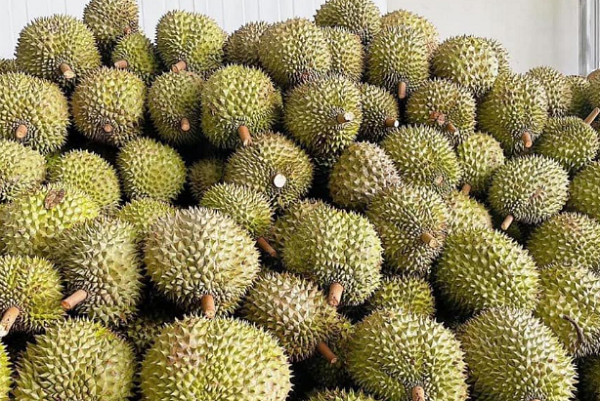Agricultures, Foods, News & Event
A series of good news for Vietnamese agricultural products going to China in the coming time
A good sign is that in the near future, China will consider opening up more Vietnamese agricultural products.

In Vietnam’s export market share of agricultural products, the Chinese market leads in the total export value of agricultural, forestry and fishery products, with a total value of 12.2 billion USD in 2023, accounting for 23.2%.
The reason why Vietnamese agricultural exports to China will grow strongly in 2023 with a growth rate of 18% over the same period last year is thanks to many protocols between Vietnam and China signed in 2022, helping Many types of agricultural products have been officially exported to this market.
On the other hand, China abolished the Zero Covid policy, reducing and gradually abolishing strict epidemic control measures, helping to release the market’s huge consumer demand, and at the same time helping the import and export customs clearance process goods, faster and more convenient.
The most prominent is the group of fruit and vegetable products, China currently accounts for nearly 54% of Vietnam’s total fruit and vegetable export value; Of which up to 90% of lychees are exported, 80% of dragon fruits are exported. In 2023, durian exports to China alone will reach 2.3 billion USD. In addition, China is also the market that consumes more than 90% of Vietnam’s cassava and products processed from cassava; more than 70% of rubber exports and is Vietnam’s third largest seafood export market.
Another good sign is that Deputy Minister of Agriculture and Rural Development Tran Thanh Nam recently led a working group including representatives of leaders of a number of units under the ministry to work with the Ministry of Agriculture and Rural Development. , General Department of Customs and Guangdong provincial government (China).
Accordingly, the two sides discussed in depth and agreed on many bilateral cooperation contents in specific fields, including: Agreeing on the organization of the Vietnam – China Agricultural Cooperation Joint Committee meeting 2nd in China in 2024; exchanging cooperation content on science and technology in the fields of green agriculture, emission reduction agriculture and organic agriculture; Strengthen investment cooperation in agriculture and two-way agricultural trade; share experiences and learn from each other about rural development between the two countries.
Deputy Minister Tran Thanh Nam said that the delegation discussed with the leaders of the General Department of Customs of China about opening the agricultural products market and reached an agreement: The two sides agreed on the content, the Chinese side will urgently complete the review. Legal review to sign 3 protocols as soon as possible, including: Protocol on exporting wild aquatic products, Protocol on exporting farmed crocodiles, Protocol on exporting farmed monkeys from Vietnam South to China.
The two sides agreed to coordinate to handle problems in import and export of sturgeon and lobster under a special mechanism and will include it in the protocol between the two countries. While waiting for the signing, the Chinese side will consider and create a special mechanism for establishments to register for export; China agreed to consider lifting the ban on importing poultry from Vietnam, and the functional units of both sides coordinate to carry out procedures to lift the ban; Include salted jellyfish in the Protocol on exporting wild seafood to Vietnam and be ready to process additional technical documents from Vietnam to open more imported avocados from Vietnam.
To soon implement the contents agreed with China, the Department of Quality, Processing and Market Development in coordination with the Vietnamese Embassy in Beijing will urgently discuss with the focal unit of the General Department of Customs. Chinese authorities to soon start the signing of the Protocol on the Export of Farmed Wild Animals, and at the same time clarify procedures for registering export establishments before signing the protocol to inform export registration establishments. Exporting products is facing difficulties due to China’s wildlife management regulations.
The remaining 1,443 codes (accounting for 48%) were registered by businesses themselves under Order 248. The groups of agricultural and food products that many businesses export to the Chinese market are mainly aquatic products and agricultural products. products of plant origin.
For Vietnam, there are industries that have traditionally exported to the Chinese market. However, there are currently industries that have signed agreements through protocols with the General Department of Customs of China to promote such as aquatic products, fresh fruit products, products of plant origin, products with animal origin to promote agricultural and food exports.
Especially since 2021, China has issued 2 orders 248 and 249 on registration of agricultural and food export enterprises and management of import and export food safety. Recently, China has approved for Vietnam Nam has more than 3,000 product codes for agricultural and food processing factories exporting to China. Therefore, in recent times, promoting the export of agricultural products to the Chinese market has been relatively favorable.
With the above prospects, experts say that in 2024, China will continue to be a potential market and there are many open opportunities for Vietnamese agricultural products to increase market share and export value. However, businesses and farmers also need to comply with planting areas, packaging facilities, food hygiene and safety, plant quarantine, and meet all technical barriers. If only one of these standards is not met, the goods will not be cleared, which will be a negative point for Vietnamese agricultural products.

